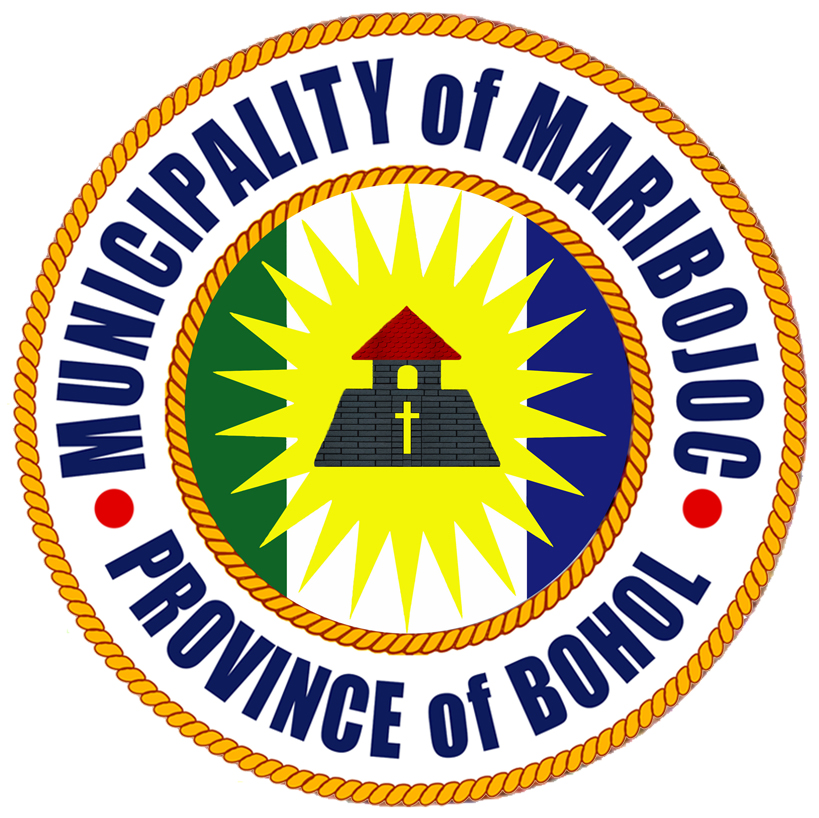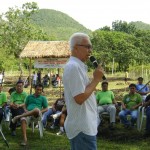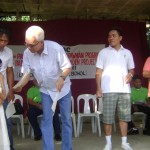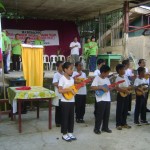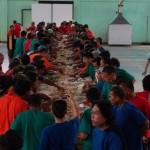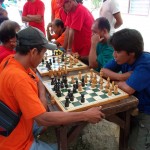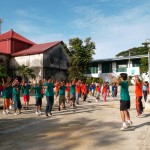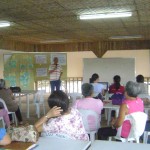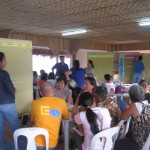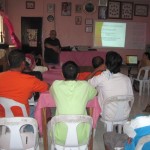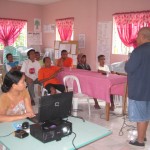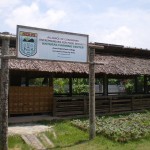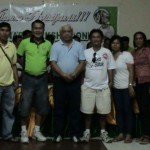Maribojoc Launches Communal Garden Project
The municipal government of Maribojoc launched communal vegetable and fruit gardens in two pilot barangays, specifically in Lincod and Dipatlong, last Tuesday morning.
Mayor Leoncio B. Evasco, Jr. announced during the launching that the communal gardens in the two pilot barangays is one of the continuing activities of the “Himsug nga Pananum, Himsug nga Katawhan” program implemented since 2007. “For poverty to be alleviated in our barangays, our people should work hard and get involved with the natural farming system advocated by the municipal government,” Evasco said.
According to Evasco, the communal gardens will be replicated in the other barangays and that Maribojoc will have an organic demo farm in the next few months. He added that the 22 barangays will soon implement barangay nurseries of their own and encouraged punong barangays and their communities to plant fruit trees to reduce the effects of global warming.
A highlight of the launching was the awarding of certificates of recognition to parents of rehabilitated children who were once malnourished and became beneficiaries of separate feeding programs implemented by LGU Maribojoc and the DepEd Maribojoc District. The parents were recognized for their support to the program, their commitment to uplift the nutritional condition of their children and for their assurance to promote healthy nutrition in their families.
Members of the Municipal Nutrition Council, the barangay councils of Lincod and Dipatlong, the executive and legislative departments of LGU Maribojoc, the DepEd Maribojoc District administrators and teachers, lot owners and parents signed a covenant last Tuesday. The covenant stated their roles and responsibilities for an effective implementation of the communal garden program.
A ceremonial planting of fruit trees and sowing of seeds at the communal garden sites culminated the activity last Tuesday. The Barangay Councils of Lincod and Dipatlong coordinated with lot owners, Fermina A. Villapaz of Lincod and Iluminada B. Baluma of Dipatlong, who allowed their respective councils to utilize their lands temporarily as communal gardens for vegetables and fruit trees. #
NNC Sponsors IYCF Training in Maribojoc
The National Nutrition Council (NNC) sponsored an Infant and Young Child Feeding (IYCF) Training at the Mayor’s Conference Hall, Maribojoc Presidencia and at the Maribojoc Parola Hall last August 15-19 for barangay-based workers.
Thirty participants, composed of nutrition scholars, health workers and mother leaders or barangay kagawads on health from ten barangays, attended the five-day training.
The Promotion of Good Nutrition-Infant & Young Child Feeding Program of the NNC identified barangays Busao, Toril, Agahay, Aliguay, San Roque, Pagnitoan, San Isidro, Candavid, Tinibgan and Punta Cruz as beneficiaries.
Provincial Health Office’s (PHO) district nutritionist for Maribojoc, Mrs. Anatolia Jabines, handled the first training day that started with an overview of accelerated hunger mitigation program and the promotion of good nutrition, as well as the nutrition guidelines for Filipinos. Jabines also gave an update of the Medium-Term Philippine – Plan of Action for Nutrition Poverty.
Public health nurse Maria Fe A. Tan, RN, discussed on the introduction of infant and young child feeding, while Dr. Rey Perpetuo G. Belderol talked on the importance of breastfeeding during the second day. Public health midwife Virginia Medequiso shared the different listening and learning techniques for infants and young children. Tan and Medequiso handled the lectures during the third day while Belderol and Tan had the fourth day. Jabines gave an overview of mother and baby-friendly community during on August 19.
Provincial health officer, Dr. Reymoses A. Cabagnot, MPH, coordinated with the punong barangays, the municipal government and the NNC for the training to take place.
The NNC is the highest policy-making and coordinating body on nutrition and is tasked to focus on hunger-mitigation and authorized to generate and mobilize resources for nutrition and hunger-mitigation programs. NNC is the oversight of the Accelerated Hunger-Mitigation Program of the national government. #
31 Maribojocanons complete Organic Vegetable Farming Training
Thirty-one Maribojocanons were able to complete the series of trainings on natural farming technology system (NFTS), vermiculture and organically grown vegetables’ production training in Nawanao, Bayacabac, Maribojoc.
The municipal government through the Municipal Agriculture Office (MAO) in collaboration with Mr. Mike Racho and Ms. Riza Sumangil of Barangay Bayacabac, Maribojoc sponsored the trainings. The half-day-per-week trainings of lectures and hands-on sessions commenced on July 21 and concluded on August 18, 2011 at the Racho residence in Sitio Nawanao.
A closing program was held last Thursday that coincided with the harvest of the different NFTS concoctions at the training venue. Sangguniang Bayan (SB) municipal councilor Florante B. Evasco, chairperson of the SB committee on Agriculture/Livelihood and Entrepreneurship updated the participants on the different measures of the legislative department and projects of the executive department on organic farming. Jose Cyril N. Lobrigas, MAO’s Agriculture Enhancement and Development Officer, was the emcee of the activity.
The municipal government of Maribojoc encourages its residents to try organic farming in their own backyards through growing of their own spices, root crops and vegetables. Private individuals and families who would like to sponsor their own series of training-sessions on organic farming in their own barangays are requested to coordinate with MAO Maria Eva Bolasco. #
Maribojoc LRED Reviewed through COMPASS Tool
The Maribojoc-Local and Regional Development (LRED) program underwent a review and re-planning using the Comprehensive Assessment (COMPASS) tool last August 4-5 at the LGU Parola Hall, San Juan, Poblacion, Maribojoc.
Local business entrepreneurs and proprietors, sectoral representatives and the development players in the municipal government comprised the participants for the tourism industry investment promotion for sustainable economic development in Maribojoc.
Department of Trade and Industry (DTI) Bohol Provincial Director Nanette Arbon shared to LRED partners the relevance of being on familiar terms with the development programs of the town. According to Arbon, an active community should match the active leadership of the municipal government.
Miriam I. Bacalso, Central Visayas Senior Regional Coordinator of the GIZ (Deutshe Gesellschaft für Internationale Zusammenarbeit or German Development Cooperation), oriented the participants on the SMEDZEP program for small and medium enterprises in partnership with DTI. Bacalso identified tourism and agri-business as Maribojoc’s economic driver and that the municipal government and the people should work for its development.
Municipal councilor Florante B. Evasco welcomed the participants during the opening program and updated them on the status of the different projects of the municipal government. Engr. Maria Nenita R. Chiu, MPDC and Maribojoc LRED focal person, presented the municipal profile, Rapid Economic Appraisal (REA) results, the burning issues and quick wins, the financial key improvements and other economic indicators since the LRED project implementation.
Rene B. Solis of GIZ discussed the statement of objectives and the workshop flow; the COMPASS proper followed thereafter with moderators from the GIZ and DTI offices of Siquijor and Bohol. The DTI-Siquijor team was composed of provincial director Nimfa M. Virtucio Marcelina Abing and Virginia A. Fernandez while Maria Soledad Balistoy, Vierna Teresa Ligan, Jerome John J. Gabin, Julius Locot and Nita A. Balaba represented DTI-Bohol.
Mayor Leoncio B. Evasco, Jr., in his message, believed that for any local government to succeed, it has to give focus to the people’s livelihood. He articulated that the LRED-COMPASS process is very important in order to assess projects, the interventions made and its results then determine the weak points and address these concerns. Evasco reiterated that the municipal government’s priority is the integrated organic farming demo farm that will highlight the natural farming system. #
Maribojoc Attends Natural Farming Workshop
An eight-member team from the municipal government of Maribojoc participated in a Seminar Workshop on Natural Farming at the ACES Natural Farming Institute in Panabo City, Davao del Norte last July 24-27, 2011.
The team was composed of municipal vice-mayor Fructuoso F. Redulla, Jr., municipal councilor Florante B. Evasco, municipal agricultural officer Maria Eva F. Bolasco, municipal engineer Raul Bernard A. Jabines, agriculture enhancement and development officer Jose Cyril N. Lobrigas, fisheries technician Agustina S. Espera, livestock technician Reyland P. Jabonillo and Roque Echavez of the municipal engineer’s office.
The ACES Natural Farming Institute, in partnership with the Alliance of Concerned Entrepreneurs for Food Security (ACE-FS), sponsored the four-day activity. Dr. Francisco P. De la Peña, president and CEO of the ACES Colleges System, was the resource person for the seminar-workshop.
An introduction on Natural Farming Systems was conducted in the first day while the rest of the training days were hands-on sessions on concoctions and natural farming techniques.
The training participants attended lecture and practicum sessions on fermented plant and fruit juices, fish amino acid, oriental herbal nutrients, lactic acid bacteria serum, 3C’s or carrots, cucumber and celery juice as well as native chicken production and natural farming on swine raising.
The local government will soon implement the Maribojoc Organic Farming Systems Development Project. One of the objectives of the program is a Natural Farming Development Institute. It will be the training ground for farmers and their families because it aims to rehabilitate and use the remaining local farming resources and increase productivity and income of farm families.
The ‘learning by doing’ organic farming academy will develop 6 hectares vegetable areas, 180 hectares rice production areas, establish 6 units of organic fertilizer production areas, construct 6 units fish pond for tilapia production and develop farm products landing areas, among others. #
